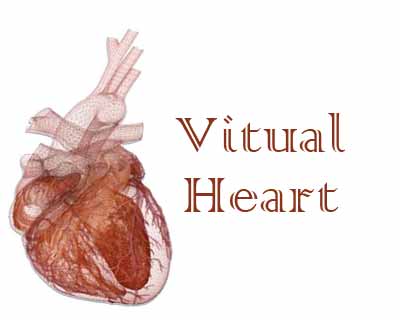- Home
- Editorial
- News
- Practice Guidelines
- Anesthesiology Guidelines
- Cancer Guidelines
- Cardiac Sciences Guidelines
- Critical Care Guidelines
- Dentistry Guidelines
- Dermatology Guidelines
- Diabetes and Endo Guidelines
- Diagnostics Guidelines
- ENT Guidelines
- Featured Practice Guidelines
- Gastroenterology Guidelines
- Geriatrics Guidelines
- Medicine Guidelines
- Nephrology Guidelines
- Neurosciences Guidelines
- Obs and Gynae Guidelines
- Ophthalmology Guidelines
- Orthopaedics Guidelines
- Paediatrics Guidelines
- Psychiatry Guidelines
- Pulmonology Guidelines
- Radiology Guidelines
- Surgery Guidelines
- Urology Guidelines
Virtual heart may prove instrumental in cardiac disease treatment

New York : A team of researchers has created a "virtual heart" that could help medical researchers study new drug therapies.
Researchers from the University of California San Diego have created a detailed computer model of the electrophysiology of congestive heart failure a leading cause of death that can simulate subtle changes from the cellular and tissue levels of the heart then show the results of the associated electrocardiogram (ECG).
According to the results, published in the journal PLOS Computational Biology, the model can show what happens to the heart when the levels and flow of calcium, potassium and sodium ions are changed.
At the organ level, the researchers created an anatomically detailed model of the heart which shows the big picture of what happens when various critical chemicals and electrophysiologic components of a healthy working heart are tweaked.
The team also found that ventricular fibrillation, where the waves of excitation that pump blood out of the heart become fragmented and discoordinated, can be caused by a heart failure-related slowdown in cellular processes at the top (basal) region of heart.
The researchers also used their model to plan a new drug strategy against this heart failure form of fibrillation.

Disclaimer: This site is primarily intended for healthcare professionals. Any content/information on this website does not replace the advice of medical and/or health professionals and should not be construed as medical/diagnostic advice/endorsement or prescription. Use of this site is subject to our terms of use, privacy policy, advertisement policy. © 2020 Minerva Medical Treatment Pvt Ltd